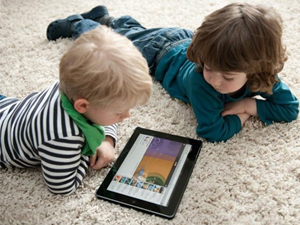



Date:27/09/18
 Limiting children's screen time to under two hours a day could improve their ability to think, say scientists.
Limiting children's screen time to under two hours a day could improve their ability to think, say scientists.
Research published in The Lancet Child & Adolescent Health journal has found limiting children's recreational screen time to less than two hours, having sufficient sleep and physical activity is linked to improved cognition, the mental process of acquiring knowledge and understanding.
Study author Dr Jeremy Walsh, from the CHEO Research Institute in Ottawa, Canada, said: “Behaviours and day-to-day activities contribute to brain and cognitive development in children, and physical activity, sedentary behaviour, and sleep might independently and collectively affect cognition.
"We found that more than two hours of recreational screen time in children was associated with poorer cognitive development.”
Researchers discovered, by analysing US children's data for eight to 11-year-old, the more of the recommendations a child fulfilled, the better their cognition. Meeting only the screen time recommendation or both the screen time and sleep recommendations had the strongest associations with cognitive development.
But scientists in Canada found only one in 20 of the 4,520 US children studied were meeting all of these key recommendations.
The advice, which forms part of the Canadian 24-hour Movement guidelines, includes nine to 11 hours of sleep, less than two hours recreational screen time and at least one hour of physical activity a day.
Just over half (51 per cent) of the children studied slept the recommended amount, more than a third (37 per cent) met the screen time guideline but only 18 per cent were getting enough physical activity. The average recreational screen time was 3.6 hours a day.
Dr Walsh added: "Based on our findings, paediatricians, parents, educators, and policymakers should promote limiting recreational screen time and prioritising healthy sleep routines throughout childhood and adolescence.”
Children and parents completed questionnaires at the start of the trial to estimate the child’s physical activity, sleep and screen time.
The children also completed a cognition test, assessing language abilities, memory, attention, working memory and processing speed.
Parents should impose a two-hour limit on screen time for brain development, scientists say
 Limiting children's screen time to under two hours a day could improve their ability to think, say scientists.
Limiting children's screen time to under two hours a day could improve their ability to think, say scientists.Research published in The Lancet Child & Adolescent Health journal has found limiting children's recreational screen time to less than two hours, having sufficient sleep and physical activity is linked to improved cognition, the mental process of acquiring knowledge and understanding.
Study author Dr Jeremy Walsh, from the CHEO Research Institute in Ottawa, Canada, said: “Behaviours and day-to-day activities contribute to brain and cognitive development in children, and physical activity, sedentary behaviour, and sleep might independently and collectively affect cognition.
"We found that more than two hours of recreational screen time in children was associated with poorer cognitive development.”
Researchers discovered, by analysing US children's data for eight to 11-year-old, the more of the recommendations a child fulfilled, the better their cognition. Meeting only the screen time recommendation or both the screen time and sleep recommendations had the strongest associations with cognitive development.
But scientists in Canada found only one in 20 of the 4,520 US children studied were meeting all of these key recommendations.
The advice, which forms part of the Canadian 24-hour Movement guidelines, includes nine to 11 hours of sleep, less than two hours recreational screen time and at least one hour of physical activity a day.
Just over half (51 per cent) of the children studied slept the recommended amount, more than a third (37 per cent) met the screen time guideline but only 18 per cent were getting enough physical activity. The average recreational screen time was 3.6 hours a day.
Dr Walsh added: "Based on our findings, paediatricians, parents, educators, and policymakers should promote limiting recreational screen time and prioritising healthy sleep routines throughout childhood and adolescence.”
Children and parents completed questionnaires at the start of the trial to estimate the child’s physical activity, sleep and screen time.
The children also completed a cognition test, assessing language abilities, memory, attention, working memory and processing speed.
Views: 374
©ictnews.az. All rights reserved.Similar news
- Azerbaijani project to monitor disease via mobile phones
- Innovative educational system to be improved under presidential decree
- NTRC prolongs license of two TV and radio organizations for 6 years
- Azerbaijan establishes e-registry for medicines
- Azerbaijani museum introduces e-guide
- Nar Mobile opens “Nar Dunyasi” sales and service center in Siyazan city
- International conference on custom electronic services held in Baku
- OIC secretary general to attend COMSTECH meeting in Baku
- Azerbaijan develops earthquake warning system
- New law to regulate transition to digital broadcasting in Azerbaijan
- Azerbaijani State Social Protection Fund introduces electronic digital signature
- Intellectual traffic management system in Baku to be commissioned in December
- Tax Ministry of Azerbaijan started receiving video-addresses
- World Bank recommends Azerbaijan to speed up e-service introduction in real estate
- Azerbaijan to shift to electronic registration of real estate





















